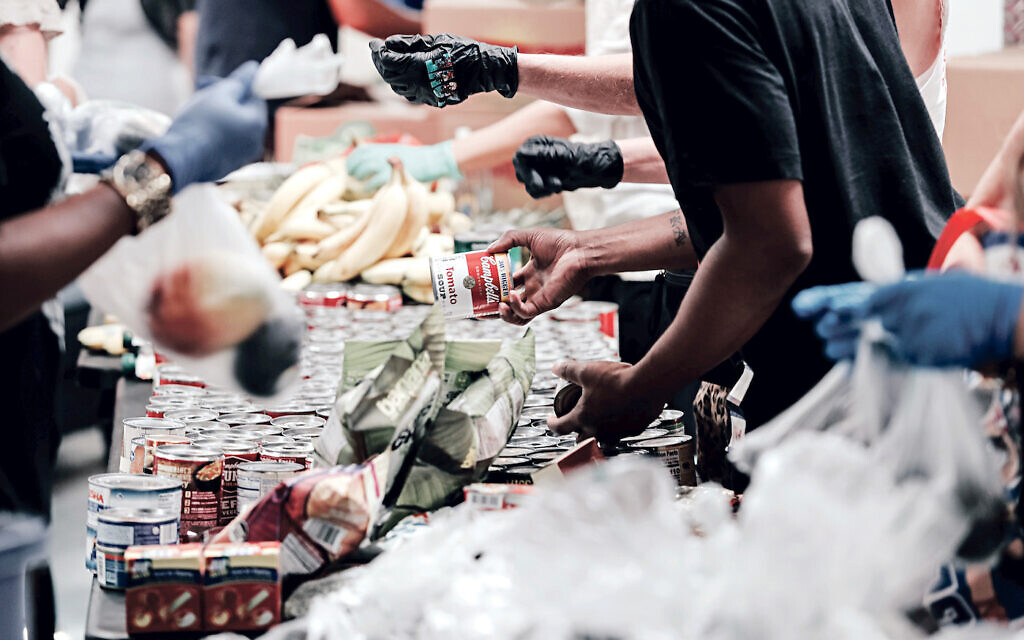Leap of faith: Food banks and benefit cuts. What would King Jehoash say?
A stimulating new series where our progressive rabbis consider how biblical figures might act when faced with 21st century issues
Every year around this time we read about the money given by the people to build the Mishkan (the tent of meeting that will travel with them) and the work of creating it. At the end of Exodus, we read Pikudei – “the accounts of the tabernacle… as they were rendered according to the commandment of Moses”. From here comes the imperative that public money has to be accounted for in detail, with transparency.
Centuries later, King Jehoash expected Temple donations given to the priests would be used to keep it in good repair. Discovering that money was given, but the Temple was not maintained, he installed a large chest with a small hole in it near the altar, where donations were deposited. Then “the royal scribe and the high priest would come, put the money into bags, and count it”. They would deliver the money to the overseers of the work who would pay the carpenters and labourers, and make “every other expenditure needed to maintain God’s House”. (2Kings12 10ff)
The imperative for transparency and proper use of public money may have been natural for Moses, but by the time of Jehoash, structures were needed to protect public funds.
Get The Jewish News Daily Edition by email and never miss our top stories Free Sign Up
The Talmud tells us: “Money for the charity fund is collected by two people and distributed by three people. It is collected by two people because one does not appoint an authority over the community composed of fewer than two. And it is distributed by three people, like the number of judges needed in cases of monetary law, since the distributors determine who receives money and how much.” (Baba Batra 8b)
There is a long-standing Jewish tradition that those who collect or disburse public money must be provably honest and doing it l’shem shamayim – not for their own benefit, but for the public good. They had to not only be honest but be seen to behave honestly. As Maimonides writes: “A city with a Jewish population must establish men who are known and reliable, who will go about among the people weekly, taking from each their fixed amount, and giving to each poor person enough food for seven days: this is called kupa.”
Likewise, they established “gabbaim who will take daily, from each courtyard, foodstuffs or money from whoever donates, and distribute the collection in the evening among the poor, giving to each a day’s sustenance, and this is called tam’hui.”
While Mishna Avot may tell us “everything belongs to God”, the reality has always been that some accrue wealth at the expense of others, misappropriating public funds.
So, given our texts exhorting public service over private gain, never allowing the control of public money to fall to an unaccountable elite, legislating communal responsibility to feed, clothe, house and maintain the poorer in society (defined as not having enough for two good meals a day), what would Jehoash or Moses say about today’s homeless, our food banks, the benefit cuts, or the writing off of fraudulently misappropriated public funds?
- by Rabbi Sylvia Rothschild, Kingston Liberal Synagogue

Thank you for helping to make Jewish News the leading source of news and opinion for the UK Jewish community. Today we're asking for your invaluable help to continue putting our community first in everything we do.
For as little as £5 a month you can help sustain the vital work we do in celebrating and standing up for Jewish life in Britain.
Jewish News holds our community together and keeps us connected. Like a synagogue, it’s where people turn to feel part of something bigger. It also proudly shows the rest of Britain the vibrancy and rich culture of modern Jewish life.
You can make a quick and easy one-off or monthly contribution of £5, £10, £20 or any other sum you’re comfortable with.
100% of your donation will help us continue celebrating our community, in all its dynamic diversity...
Engaging
Being a community platform means so much more than producing a newspaper and website. One of our proudest roles is media partnering with our invaluable charities to amplify the outstanding work they do to help us all.
Celebrating
There’s no shortage of oys in the world but Jewish News takes every opportunity to celebrate the joys too, through projects like Night of Heroes, 40 Under 40 and other compelling countdowns that make the community kvell with pride.
Pioneering
In the first collaboration between media outlets from different faiths, Jewish News worked with British Muslim TV and Church Times to produce a list of young activists leading the way on interfaith understanding.
Campaigning
Royal Mail issued a stamp honouring Holocaust hero Sir Nicholas Winton after a Jewish News campaign attracted more than 100,000 backers. Jewish Newsalso produces special editions of the paper highlighting pressing issues including mental health and Holocaust remembrance.
Easy access
In an age when news is readily accessible, Jewish News provides high-quality content free online and offline, removing any financial barriers to connecting people.
Voice of our community to wider society
The Jewish News team regularly appears on TV, radio and on the pages of the national press to comment on stories about the Jewish community. Easy access to the paper on the streets of London also means Jewish News provides an invaluable window into the community for the country at large.
We hope you agree all this is worth preserving.
-
By Brigit Grant
-
By Laurent Vaughan - Senior Associate (Bishop & Sewell Solicitors)
-
By Laurent Vaughan - Senior Associate (Bishop & Sewell Solicitors)
-
By Laurent Vaughan - Senior Associate (Bishop & Sewell Solicitors)
-
By Laurent Vaughan - Senior Associate (Bishop & Sewell Solicitors)






















